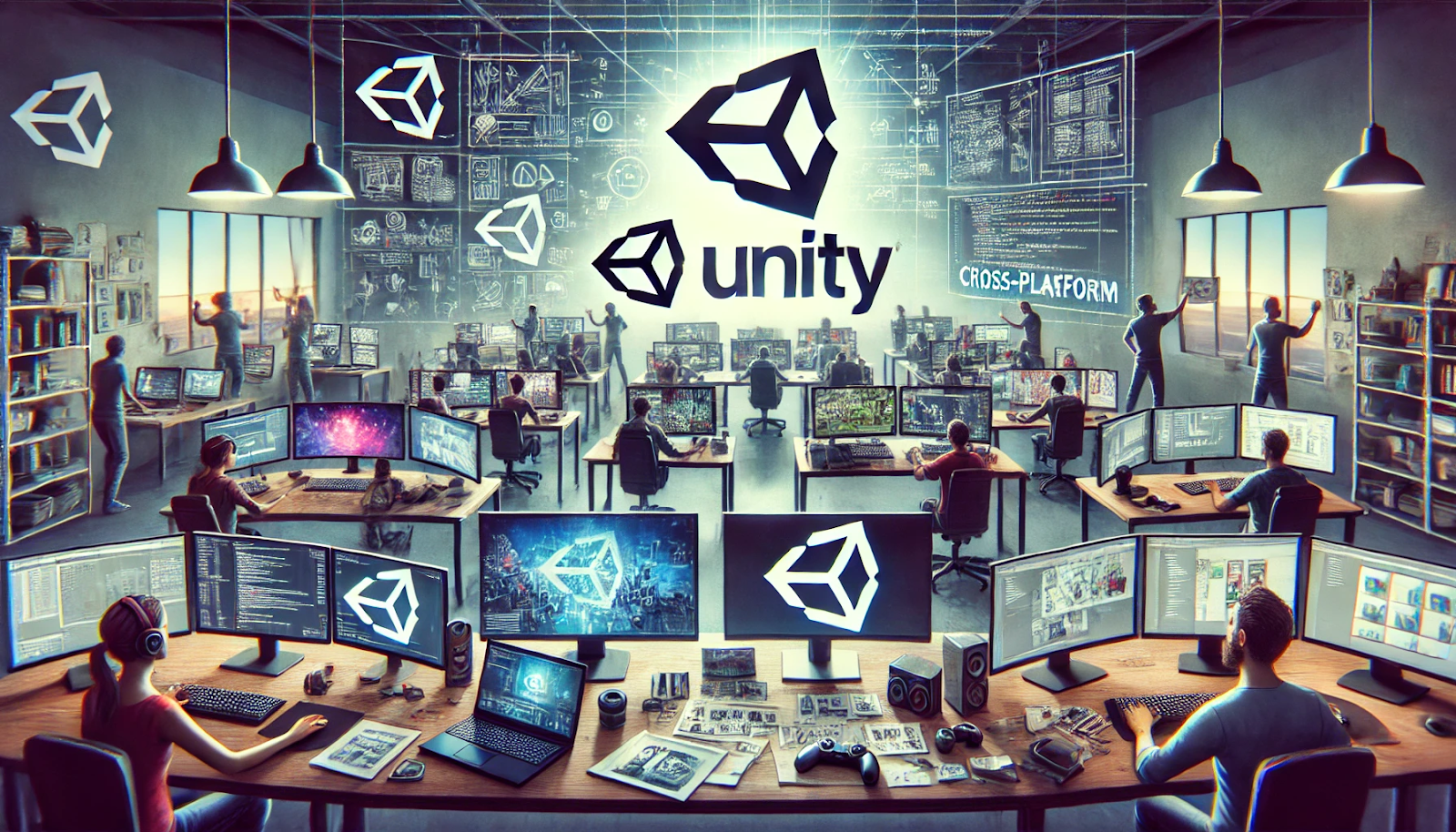In today’s dynamic gaming industry, developers face the challenge of creating games that are compatible across multiple platforms, from mobile devices to consoles and desktops. This is where the Unity game development engine shines, becoming the go-to tool for game development studios across the globe. In this blog, we’ll explore the key reasons why Unity has become a preferred choice for cross-platform game development.
1. One Codebase for Multiple Platforms
One of Unity’s strongest selling points is its ability to support cross-platform game development with a single codebase. Instead of writing different versions of the game for each platform (iOS, Android, PlayStation, PC, etc.), developers can write their game once and deploy it across multiple devices. This feature dramatically reduces development time and cost, making it highly appealing to game development studios looking to reach a broad audience with minimal overhead.
2. Extensive Platform Support
Unity supports a wide range of platforms, including but not limited to:
- Mobile (iOS, Android)
- Consoles (PlayStation, Xbox, Nintendo Switch)
- PC (Windows, Mac, Linux)
- Web (WebGL)
- AR/VR devices (Oculus, HTC Vive, Hololens)
- Smart TVs
This extensive platform support ensures that developers can bring their games to various ecosystems without needing to rebuild them from scratch. The ability to deploy to multiple platforms from one engine makes Unity incredibly versatile, saving both time and resources.
3. Ease of Use and Rapid Prototyping
Unity is known for being user-friendly, especially for small teams or indie developers. Its drag-and-drop interface, coupled with an extensive asset store, allows developers to rapidly prototype and iterate on their game designs. This ease of use is a major advantage for game development studios that need to quickly test game concepts or release updates across platforms without significant delays. With Unity’s intuitive tools, developers can focus on creativity and design rather than being bogged down by technical complexities.
4. Rich Asset Store and Community Support
Unity’s Asset Store provides game developers access to a vast library of pre-built assets, plugins, scripts, and tools. These resources not only accelerate development but also enhance the quality of the game by allowing developers to leverage high-quality, pre-existing assets. Additionally, Unity has a large, vibrant community of developers. This means that game development studios using Unity benefit from shared knowledge, tutorials, and third-party tools, making problem-solving and innovation easier.
5. Scalability and Optimization for Performance
While Unity is often associated with indie or mobile game development, it is also highly scalable for larger, more complex projects. Unity’s burst compiler and job system ensure high performance across different platforms, allowing developers to optimize their games for low-end devices while still maintaining high-quality graphics and gameplay for high-end hardware. This flexibility makes Unity a great choice for cross-platform development, as it allows developers to cater to a wide variety of device specifications without sacrificing performance.
6. Unity’s Strong VR and AR Capabilities
In recent years, virtual reality (VR) and augmented reality (AR) have gained significant traction in the gaming world. Unity is at the forefront of VR/AR development with dedicated tools and frameworks for these technologies. Unity’s support for VR/AR platforms like Oculus, HTC Vive, and Hololens makes it the preferred engine for studios venturing into immersive technologies. As VR development services become increasingly popular, Unity’s robust VR/AR toolset provides developers with the resources they need to build compelling, immersive games.
7. Constant Updates and Innovations
Unity Technologies consistently updates its engine to ensure it stays at the cutting edge of game development technology. Regular updates include improvements in graphics rendering, physics, and performance optimization, as well as new features like machine learning tools and real-time ray tracing. For game development studios that rely on the latest technology to stay competitive, Unity’s commitment to innovation is a major selling point.
8. Cost-Effectiveness
Another reason Unity is favored by game developers is its cost-effectiveness. Unity offers a free version of the engine, which includes a majority of the features required to develop high-quality games. This democratization of game development tools has allowed indie developers and small studios to create games without a heavy upfront investment. For larger studios, the Unity Pro version provides additional advanced features at a competitive price point compared to other engines like Unreal.
Conclusion
For game development studios, Unity offers the perfect blend of ease of use, flexibility, and powerful features needed to create high-quality games across multiple platforms. Whether developing for mobile, console, PC, or VR, Unity’s ability to scale, coupled with its vast community and asset ecosystem, ensures that it remains a dominant player in the world of cross-platform game development.
As the gaming industry continues to evolve, Unity’s commitment to innovation and platform versatility ensures that it will remain the go-to engine for developers looking to bring their games to the widest possible audience with minimal hassle.
Frequently Asked Questions
1. Why is Unity a preferred choice for cross-platform game development?
Unity allows developers to write code once and deploy it across multiple platforms (iOS, Android, Windows, PlayStation, etc.), making development faster and more cost-effective.
2. What platforms can Unity support?
Unity supports a wide array of platforms, including mobile (iOS, Android), desktop (Windows, Mac, Linux), consoles (PlayStation, Xbox), and VR/AR platforms (Oculus, HTC Vive).
3. How does Unity help with game optimization?
Unity provides powerful tools like the Burst Compiler and Job System, which help optimize game performance, ensuring smooth gameplay on both high-end and low-end devices.
4. Is Unity suitable for large-scale game development?
Yes, Unity is scalable and used by both indie developers and major studios, making it ideal for complex, large-scale projects.
5. Why is Unity popular for VR and AR game development?
Unity offers strong support for VR/AR platforms and has dedicated tools that make it easier to build immersive experiences for devices like Oculus and Hololens.











